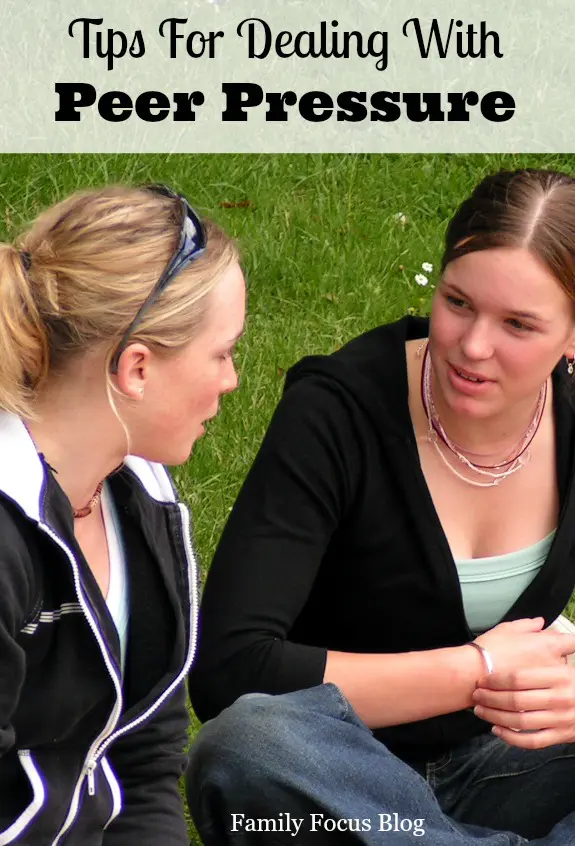Peer pressure has always been a source of teen stress. No matter the generation or political and social landscape, effects of peer pressure among teens can last a lifetime. In many ways this type of pressure starts innocently. It can take the form of a small request, like joining a group of friends at a party. From there, more dangerous pressures and situations can arise. As a teen you feel the need to fit in and want to connect with others. Social exclusion is a horrible experience no one should face in high school. The pressure your teen faces from others feels very real. The key to dealing with peer pressure is helping your teen know who they really are and what their limits are. Here are five tips you can give your teen for dealing with peer pressure among teens.
An open exchange of communication is key. First you may want to discuss what peer pressure is.
Definition of Peer Pressure
When people of the same age group try to influence how your teen acts or try to get your teen to do something, that is definition of peer pressure. It can range from something as innocent as sitting at their table or something not so innocent, such as drinking alcohol.
Then move on to some tips for how to handle peer pressure.
5 Tips For Dealing With Peer Pressure Among Teens
Dealing with peer pressure can be challenging, but setting boundaries and knowing your values is key. First, stay true to what feels right for you, whether that’s standing firm on a decision or walking away. Surround yourself with friends who respect your choices and support your individuality. Practice saying “no” confidently so that it comes naturally when you need it. If you feel unsure, consider taking a moment to think through the consequences of a decision instead of rushing to conform. Finally, remember that staying authentic to yourself will help you build confidence and resilience against pressure from others.
Join the Right Crowd
The best way to avid peer pressure among teens is to have a group of friends that lifts you up. Your friends are an important aspect of who you are and a representation of what kind of behavior you are willing to tolerate. Find friends who share your interests, move in similar clubs and circles, and who respect you. In turn, show the same respect toward friends you make. You may not see yourself as a bully, but you may be pressuring your friends and not even realize it.
Develop Your Own Moral Compass
Be introspective and take the time to develop your own sense of what is right and wrong. Don’t let others push you to make a decision that you believe is wrong. By developing and adhering to your own morals, and family values, your self-esteem will naturally increase over time and you will find yourself starting to care less about what others think of you, and more about what you think of yourself. When you know yourself best the rest is easy, a flimsy moral ground will ultimately lead to trouble.
Try to Avoid Negative Situations
If you see any activity you believe is suspicious, turn around and walk in the opposite direction. People are a lot less likely try to pressure you into doing something you shouldn’t if you simply aren’t in the area. Stay away from parties you know will have trouble. Try not to put yourself in situations where you are confronted with peer pressure among teens and dangerous choices.
Know Who Your Real Friends Are
If you hang around people that try to get you to smoke, drink, do drugs, or any other activities that could be detrimental to your health, they are not your friends. If those people really cared about your safety, like a true friend should, they would not try to put you in a position where you feel pressured to compromise yourself or your morals. Do your best to remove those people from your life and replace them with better influences.
Understand the Potential Consequences of Your Actions
At this time of life you may feel you are indestructible. Most teens are at the peak of their physical abilities, and are still developing and growing mentally at a rapid pace. But keep in mind, every action has a consequence. Smoking may look and feel cool when you are young, but could lead to many health complications down the road. In the heat of the moment, texting while driving may not seem like the end of the world, but it could cause a major fatality. A car accident lawyer reminds that 51% of traffic fatalities in 2012 were a result of alcohol or drugs. Don’t become another statistic and be aware of where your actions could lead.
You may want to come up with some secret communication for how they can enlist your help when they are feeling peer pressure. For example, texting you with “PP, can I get a ride?” or some other such signal that they are experiencing peer pressure and need an out.
Healthy Ways To Deal With The Stress Of Peer Pressure
Here are some healthy ways to manage the stress that can come from peer pressure:
- Practice mindfulness or meditation – Taking a few minutes to breathe deeply and focus can reduce anxiety and help you think more clearly.
- Engage in physical activity – Exercise, whether it’s a walk, run, or dance, releases endorphins that improve your mood and reduce stress.
- Talk to someone you trust – Sharing your feelings with a friend, family member, or mentor can give you perspective and support.
- Journaling – Writing down your thoughts can help process emotions and track situations where peer pressure is affecting you.
- Practice self-care – Prioritize activities that make you feel good, such as hobbies, listening to music, or reading a book.
- Set personal boundaries – Knowing what you’re comfortable with and sticking to it reduces the stress of making decisions on the spot.
- Plan positive affirmations – Remind yourself of your strengths and what makes you unique, which can build confidence to say no when needed.
- Focus on personal goals – Keep your own goals in mind so you’re less likely to let peer pressure sidetrack you.
- Learn relaxation techniques – Techniques like progressive muscle relaxation or guided imagery can help you decompress in stressful moments.
- Seek professional help if needed – Speaking with a counselor or therapist can provide tools and strategies tailored to your experience.
These strategies can support you in staying calm and confident while handling peer pressure in a healthy way.
Conclusion
I hope you find these five tips for dealing with peer pressure among teens useful when talking with your teen. Remember that the main thing is to keep the door open for communication and don’t be afraid to bring up important issues. I want my daughter to know that I am nosey because I care! Is your teen facing peer pressure? What are your best parenting teens tips?
Related Post:
5 Important Conversations Every Parent Needs To Have With Their Children


